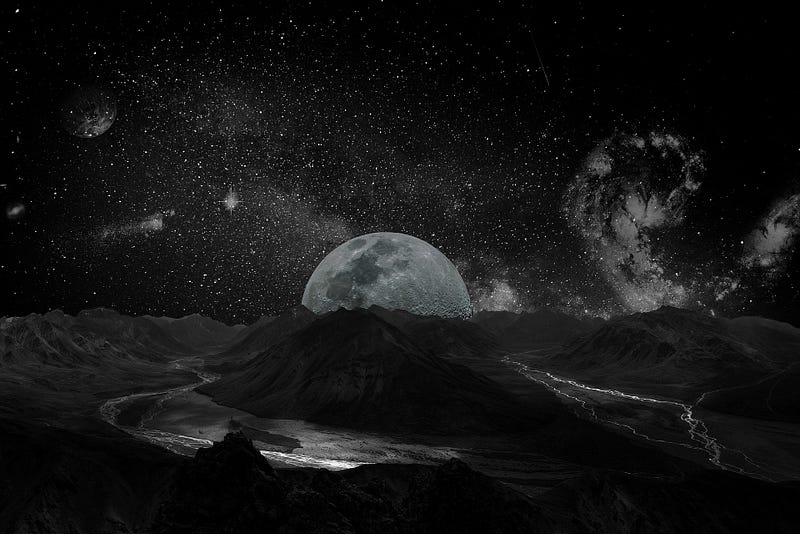Exploring the Endless Wonders of Space and Our Curiosity
Written on
Chapter 1: The Allure of the Cosmos
When we gaze up at the night sky, each person perceives something unique.

My younger brother, just eight years old, captured this sentiment perfectly when I asked him about his fascination with stars and galaxies. He expressed, "Space is incredible and awe-inspiring due to its vastness. It's beautiful and full of mysteries, with enormous cosmic entities like black holes and neutron stars."
He’s absolutely right. The universe is vast. As children, everything feels expansive and limitless; the world appears to be an infinite space that keeps stretching. However, upon reaching adulthood, we start to grasp how small we truly are.
The journey to school, once perceived as a long trek, now feels trivial. Even our planet seems compact. With air travel, we can traverse the globe in less than a day. We have nearly mapped our entire planet, gaining visibility into nearly every corner, city, and settlement. It often feels like we've uncovered all Earth's secrets.
Yet, there remains one domain shrouded in mystery—the infinite expanse beyond our planet. What is it about space that continues to intrigue us throughout our lives?
Section 1.1: The Nature of Human Curiosity
Humans are inherently curious, a trait that has played a crucial role in our survival on Earth. Our quest for knowledge has led to the development of tools, the domestication of animals, and advancements in agriculture. Without curiosity, our progress would have been stunted.
However, curiosity extends beyond mere survival; it shapes our identities. I recall receiving my first book about space at the age of six or seven. As I flipped through the pages, learning about the solar system ignited a torrent of questions within me.
"How can Venus be so hot when Mercury is the closest planet? Why is Mars red while Earth is green? What causes Saturn’s icy rings?"
Curiosity is a magnificent force. It fuels our imagination, which, in turn, defines who we are. For me, pondering the wonders of space enhanced my inquisitive spirit, transforming me into a thinker, a dreamer, and an idealist.
But our perceptions are also shaped by what we hear and experience. I vividly remember being frightened by the theme music of the X-Files as a child. The eerie sounds instilled a sense of dread within me.
While we may not know what lies beyond, the thought of being observed by unknown entities can be unsettling.
Section 1.2: The Influence of External Forces
We often believe we control our thoughts, distinguishing between what truly influences us and what we think independently. However, this is often misleading.
When I received my PlayStation 2, one of my favorite games was Ratchet and Clank, set in a fantastical universe where you play as a Lombax trying to thwart an evil antagonist. I was captivated by the idea of discovering new worlds and encountering bizarre creatures, living out a saga that spanned entire galaxies.
I never doubted that humanity could someday reach such heights; I merely pondered when it would happen. The Ratchet and Clank universe is populated with diverse alien beings, some resembling humans, and others representing primitive societies. If we were to discover such civilizations, how would we interact with them?
While many speculate about extraterrestrial invasions of Earth, what if we became that technologically advanced species one day? What would human ethics look like in such a scenario?
Perhaps the most well-known game that explores this concept is Spore. In Spore, you nurture a single-celled organism and guide its evolution into a primitive life form. You eventually develop a tribe, a city, and ultimately a species capable of interstellar travel. Your choices determine the traits of your civilization, and once you reach the space age, you must decide how to engage with other planetary inhabitants. Do you leave them be, share your technology, or eliminate them?
It is only when you hold such power that you realize the extent of your influence. While we have already dominated our own planet, will we replicate that dominance elsewhere?
Video games and films excel at weaving these narratives. This is one reason works like "Gravity" and "The Martian" resonate so well; they challenge our perceptions and ignite our imaginations. They remind us that, despite any limitations we perceive, we can achieve the extraordinary—even if it occurs beyond our lifetimes.
However, the most unsettling aspect is the possibility that the scenarios depicted in these games and films could be unfolding right now. In a nearly infinite universe brimming with trillions of galaxies, can we confidently assert that advanced civilizations aren't already out there, engaging in intergalactic trade or worse, exploitation?
The more we learn about space, the more questions arise.
As I reflect on my brother's fascination with space, I recognize not only his unique imagination but also the same curiosity that propels all of us.
When we stare into the cosmos, each person sees something distinct. Some witness an infinite array of stars; others envision humanity's future, while still others perceive hope.
Space captivates our spirits because it remains the final frontier, where our imaginations can roam freely. And this reality is unlikely to change anytime soon.
Chapter 2: The Fascination of Space
Why does space captivate humanity? This video dives into the reasons behind our fascination with the cosmos.
Exploring the concept of black holes, this video offers insights into one of the universe's most mysterious phenomena.